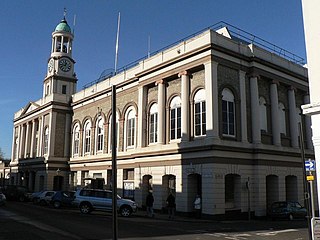
Neath is a market town and community situated in the Neath Port Talbot County Borough, Wales. The town had a population of 50,658 in 2011. The community of the parish of Neath had a population of 19,258 in 2011. Historically in Glamorgan, the town is located on the River Neath, seven miles east-northeast of Swansea.

The Hazlitt Theatre and Exchange Studio, also known as the Hazlitt Arts Centre, is a theatre complex in Earl Street in Maidstone, Kent, England. The oldest part of the complex, which is now used as a shopping complex on the ground floor, and as a theatre venue known as the "Exchange Studio" on the first floor, is a Grade II listed building.

The Hall for Cornwall, known as Truro City Hall until 1997, is an events venue in Boscawen Street in Truro, Cornwall, England. The building, which was previously the headquarters of Truro City Council, is a Grade II* listed building.

The Gwyn Hall was previously a four-storey Victorian theatre in the town centre of Neath, Wales. Following a fire in 2007 it was substantially rebuilt, retaining its facade but moving the theatre to the ground floor, with flexible seating configurations. The third floor houses a cinema pod and a third screen for films with retractable seating. In addition, a glass atrium cafe was added to the frontage which was previously the car park.

Cowbridge Town Hall is a public building in the High Street of Cowbridge in South Wales. The town hall, which is the meeting place for Cowbridge with Llanblethian Town Council, and also houses the town clerk's office, the committee rooms and the Cowbridge Museum, is a Grade II* listed building.

Wandsworth Town Hall is a municipal building on the corner of Wandsworth High Street and Fairfield Street in Wandsworth, London. The building, which is the headquarters of Wandsworth London Borough Council, is a Grade II listed building.

Calne Town Hall is a municipal building in The Strand, Calne, Wiltshire, England. The town hall, which is the meeting place of Calne Town Council, is a grade II listed building.

Dudley Council House is a municipal building in Priory Road, Dudley, West Midlands, England. The Council House, which is the meeting place of Dudley Metropolitan Borough Council is a Grade II listed building.

Bridgwater Town Hall is a municipal building in the High Street, Bridgwater, Somerset, England. The town hall, which was the headquarters of Bridgwater Borough Council, is a Grade II listed building.

Chippenham Town Hall is a 19th-century municipal building in the High Street, Chippenham, Wiltshire, England. The town hall, which was the headquarters of Chippenham Borough Council, is a Grade II listed building.

Ryde Town Hall is a municipal structure in Lind Street in Ryde, Isle of Wight, England. The town hall, which was the headquarters of Ryde Borough Council, is a Grade II listed building.

The Municipal Buildings, also known as the Corn Exchange and Town Hall, are located on the north side of High East Street in Dorchester, Dorset, England. The structure, which incorporates the meeting place of Dorchester Town Council and an arts and community venue, is a Grade II* listed building.

Oswestry Guildhall is a municipal building in Bailey Head in Oswestry, Shropshire, England. The structure, which was the meeting place of Oswestry Municipal Borough Council, is a Grade II listed building.

Blandford Forum Town Hall is a municipal building in the Market Place in Blandford Forum, Dorset, England. The 18th-century structure, which was the meeting place of Blandford Forum Borough Council, is a Grade I listed building.

Montgomery Town Hall is a municipal building in Broad Street, Montgomery, Wales. It served as the meeting place of Montgomery Borough Council and is a Grade II* listed building.

Hartlepool Borough Hall is municipal building, which served as the meeting place of the old Hartlepool Borough Council, before it amalgamated with West Hartlepool County Borough Council. It is located on the Headland, Hartlepool in County Durham, England and is a Grade II listed building.

Denbigh Town Hall, is a municipal building in Crown Lane, Denbigh, Denbighshire, Wales. The structure, which is the meeting place of Denbigh Town Council, is a Grade II* listed building.

Pwllheli Town Hall is a municipal building in Penlan Street, Pwllheli, Gwynedd, Wales. The structure, which now operates as an arts centre, is a Grade II listed building.

Grosmont Town Hall is a municipal building in Grosmont, Monmouthshire, Wales. The structure, which is the meeting place of Grosmont Community Council, is a Grade II listed building.

The Old Town Hall is a municipal building in Old Market Street, Usk, Monmouthshire, Wales. The structure, used as the local club of the Royal British Legion, is a Grade II listed building.





















